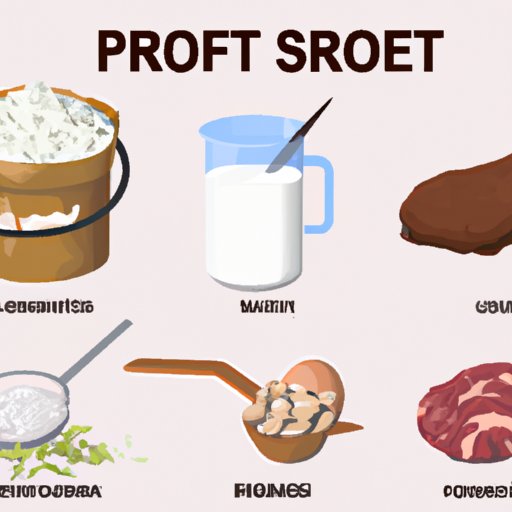
Introduction
Protein is an essential nutrient that many people struggle to get enough of. Whether you’re a fitness enthusiast, a vegetarian or simply someone who wants to build more muscle and maintain optimal health, getting enough protein is crucial for many reasons. But with so many different protein sources available and conflicting advice about how much you need, it can be hard to figure out what works best for you.
In this article, we will provide you with some proven tips and strategies to help you easily increase your protein intake and achieve your health and fitness goals.
Start with the basics: What is protein and why is it important?
Protein is one of the three macronutrients that our body needs and it plays a vital role in many essential bodily functions. It is made up of amino acids, which are the building blocks of our muscles, organs, skin, and more. Protein also helps to regulate our hormones and enzymes and keeps our bones, cartilage and blood healthy.
The amount of protein that each person needs varies depending on various factors such as age, gender, weight, activity level, and goals. In general, most adults need around 0.8-1 gram of protein per kilogram of body weight per day.
Discuss protein-rich foods
One of the easiest ways to add more protein to your diet is to focus on protein-rich foods. Here are some high-protein foods you can add to your meals:
– Meats such as chicken, turkey, beef, and pork
– Fish such as salmon, tuna, halibut, and cod
– Eggs
– Dairy products such as milk, cheese, and yogurt
– Beans and legumes such as lentils, chickpeas, and black beans
– Nuts and seeds such as almonds, peanuts, and sunflower seeds.
When incorporating these foods into your diet, try to choose high-quality sources and make sure you have a balanced and varied diet by including vegetables, fruits, and healthy fats as well. These foods are also very versatile and can be added to meals in a variety of ways, such as using legumes and nuts in salads or incorporating eggs into your breakfast.
Consider plant-based protein
Plant-based protein sources can also be an excellent option for those who prefer to eat vegetarian or vegan or those who just want to reduce their intake of animal products. Some of the best plant-based protein sources include:
– Tofu
– Lentils
– Chia seeds
– Quinoa
– Edamame.
Incorporating plant-based protein can have a myriad of benefits, such as reducing your risk of heart disease and some other chronic diseases, as well as being more environmentally friendly.
Highlight protein-rich snacks
If you need a protein boost between meals, protein-rich snacks can be a great option to help you feel full and energized. Here are some easy and tasty options:
– Greek yogurt
– Hard-boiled eggs
– Nuts and seeds
– Protein bars
– Turkey jerky.
These snacks can also be great to have on hand whenever you need some quick fuel during the day. Opt for snacks with minimal added sugars and preservatives and try to pair your protein with other healthy snacks such as fruits or veggies.
Share protein-packed recipes
Adding high-protein meals to your menu is also essential for increasing your protein intake. Here are a few simple recipes to get you started:
Breakfast
Egg and Quinoa Breakfast Bowl
– 1/2 cup cooked quinoa
– 2 large eggs
– 1/2 avocado
– 1/2 chopped tomato
– Salt and pepper to taste
– Optional: hot sauce or salsa for topping
Instructions: Cook quinoa in water according to package instructions. In a pan, fry two whole eggs until over-easy. Combine cooked quinoa, tomato, avocado, and eggs in the bowl. Add salt, pepper, and hot sauce if desired.
Lunch
Grilled Chicken Salad
– 4 ounces grilled chicken breast
– 2 cups mixed greens
– 1 sliced cucumber
– 1/2 sliced avocado
– 1/4 cup slivered almonds
– Dressing of your choice
Instructions: Grill chicken breast and combine with vegetables, almonds, and salad dressing in a bowl.
Dinner
Salmon and Quinoa Bowl
– 4 ounces cooked salmon
– 1/2 cup cooked quinoa
– 2 cups mixed vegetables such as zucchini, broccoli, and bell pepper
– Salt and pepper to taste
– Optional: lemon or lime juice for topping
Instructions: Grill salmon and cook mixed vegetables in a pan. Combine quinoa, vegetables, and salmon in a bowl. Add salt, pepper, and lemon juice if desired.
Discuss protein supplements
If you still struggle to meet your protein needs, supplements can also be a useful way to add more protein to your diet. Protein supplements come in many forms, such as powders, bars, and shakes, and they are a convenient way to get protein on the go. However, they are not a replacement for whole foods, and you should always speak to your doctor or a nutrition expert before using a supplement.
Some reputable protein supplement brands include Optimum Nutrition, Quest Nutrition, and Garden of Life. When choosing a supplement, be sure to check for any allergens and read the label for added sugars or artificial ingredients that can be harmful.
End with helpful tips:
Here are some additional tips to help you increase your protein intake:
– Plan your meals ahead to ensure that you get enough protein in each meal
– Cook and meal prep in batches to save time and ensure a protein-rich meal is always on hand
– Choose healthier swaps such as swapping white bread with protein-rich whole-grain bread or having a protein shake as part of your midday snack.
Getting enough protein in your diet is essential for overall health and fitness. By focusing on protein-rich food, incorporating more plant-based protein, incorporating protein-rich snacks, trying out recipes and knowing when it is ideal to include supplements, you can guarantee that you’re meeting your daily intake and living a healthy lifestyle.





